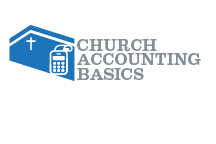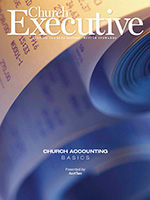By Tammy Bunting

One definition of “dread” is managing payroll without qualified staff. For those churches with limited resources, ministerial staffing positions must be filled first. A common sentiment among pastoral leadership regarding payroll is, How hard can it be?
Well, it is hard. And, some mistakes could lead to serious consequences.
The relationship between the employee and employer has its challenges. First, it’s highly regulated at both the federal and state levels. There are countless rules you need to know, and some can open the door to costly mistakes.
On the flip side, we value our employees — and paying them is not only our responsibility, but our privilege. So, how can we safeguard one of our greatest assets in fulfilling our mission: our employees?
Let’s start with Luke 20:25: “And He said to them, ‘Then render to Caesar the things that are Caesar’s, and to God the things that are God’s.’”
Making sure the government gets what it’s due is a fact of life that existed even in Jesus’s day, so I think it warrants a discussion.
Are your ducks in a row?
Compliance to IRS rules and regulations can be an arduous task at the best of times. Add in the ever-changing rules by which we operate and manage our payroll, and you’ve got enough confusion to pretty easily find yourself in some hot water with the IRS.
Case in point: In 2010, the IRS initiated the Employment Tax Research Project (ETRP). The purpose was to review payroll practices in four main areas: worker misclassification, fringe benefits, executive compensation, and payroll taxes. The reason was to find weaknesses and open the door for audits and penalties. Employment tax continues to be a hot button for the IRS. The goal is to collect more taxes and assess penalties for those in violation.
Misclassification of workers
The misclassification of workers has recently been a topic of discussion among many accounting and tax professionals. The U.S. Department of Labor has proposed new regulations designed to expand overtime protection for workers. Taking the time to review your employee classification will help you understand if these new regulations put you at risk or will impact your organization.
#1: Review worker classifications of employees to ensure that exempt versus non-exempt determinations are accurate.
#2: Review worker classifications of employees to ensure that exempt versus non-exempt determination are accurate.
It’s always a good practice to review job descriptions and make sure the job functions and descriptions are in line with each other.
This also holds true for those who fall under the ministerial exception. You must be able to clearly identify a worker’s classification and — in the minister’s case — defend the non-employee status. Churches that incorrectly treat paid workers as ministers could violate federal payroll reporting obligations, possibly leading to IRS penalties.
Fringe benefits
How you value fringe benefits for income tax purposes can be complicated. Presenting gift cards to staff is a common practice in churches. Gift cards are often viewed as non-taxable by church staff, but they’re equivalent to cash and must be included on the W2.
Just because a certain fringe benefit is taxable doesn’t mean you’re not allowed to offer it. Go ahead and give gift cards. Just remember to add the value to the employee’s taxable wages.
Another example of a taxable fringe benefit is covering the cost for spouses of senior leadership to accompany the employee when traveling on church business. Just because these benefits are taxable doesn’t mean they shouldn’t be offered. Just remember: It’s the church’s responsibility to include the benefit as taxable on the W2.
Executive compensation

The IRS is charged with enforcing the Federal Private Inurement Prohibition, which strictly forbids a tax-exempt organization’s decision-makers from receiving unreasonable benefits from the nonprofit’s income or assets. Excessive compensation could be in violation of the IRS ruling and can potentially result in fines and penalties. Without going into specific detail on the regulations governing executive compensation, I recommend you ensure that your compensation policy is in compliance with the IRS rules and be prepared to defend to the IRS that the compensation is appropriate. It’s always a good idea to connect with a consultant to perform a compensation study that can provide you with a report documenting your policies and proof that you’re operating within the proper guidelines.
Payroll taxes
For those of us working in the back office of a church, there’s nothing worse than being on hold with the IRS. If you mess up your payroll taxes, it can take years of conversations and letters going back and forth to get it corrected.
If you’re processing your own payroll, be sure to file your tax deposits on time. When preparing the W2s at year’s-end, make sure the information is correct. Mismatching names and Social Security numbers is one of the most common W2 filing errors, resulting in earnings not being properly credited to employees and problems with Social Security payments. Ignoring other taxable items — including the fringe benefits mentioned above — can also cause issues when reconciling your taxable wages.
How hard can it be … right?
Churches aren’t exempt from following and executing proper payroll-related procedures every time. Be informed. Ignorance isn’t bliss — and it’s not an excuse! There are professionals available to help you set up, manage and audit all things relating to payroll in your organization. Take advantage of their expertise, and get all your ducks in a row.
Tammy Bunting is the Director of Not-for-Profit Services at AcctTwo, which provides cloud-based financial management software and outsourced accounting for churches. AcctTwo’s solutions help churches automate processes, increase accuracy, and provide a complete financial picture.


